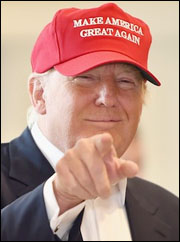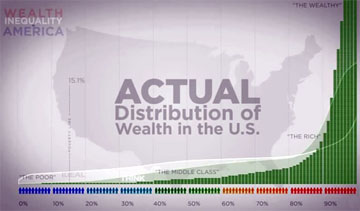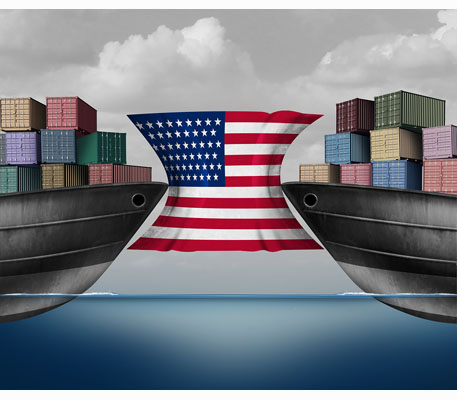OPINION
Mirror, mirror: Who’s to blame for our economic insecurity?
By KEN WINKES
 (June 21, 2018) — “Make American Great Again,” the candidate trumpeted just two years ago.
(June 21, 2018) — “Make American Great Again,” the candidate trumpeted just two years ago.
Count me in. I’m all for a great America. But there are unmistakable signs our president is a far better at politics than he is at diagnosing what ails us. Mr. Trump got elected, but does he really know what’s wrong with the country?
I have my doubts.
In poll after poll, people say that economic insecurity tops the list of their many worries. College debt. Vanishing defined-benefit private pensions, now covering less than one fifth of our workers. A Supreme Court that defends corporations at the expense of workers. Social Security under continuous attack from the right. A rickety and expensive healthcare system, with fewer now insured than there were a year ago.* Failing infrastructure everywhere. Unaffordable housing and a decline in the rate of home ownership. Wage stagnation or meager growth that does not keep up with inflation.
It doesn’t take sophisticated math skills to find the common denominator.
Looked at in dollars and cents, each item tells us something about the way we have chosen to divide the national pie. Each is a symptom of the growing gap between the rich and the poor, between the wealthy (whose top 1 percent now control more than 40 percent of the nation’s assets) and the shrinking middle class. The nation is now at nearly full employment, but still millions of America’s workers can barely survive from paycheck to paycheck. More than half of our elderly in nursing homes are on Medicaid. Yes, people’s worries are justified. **
 During his campaign, Trump hinted at the need to rein in Wall Street, make affordable healthcare available to everyone, and to protect Social Security and Medicare. But since his election, the president seems to have forgotten the economic populism he promised. The great tax giveaway of 2018 shunted more than 80 percent of its benefits to the already unimaginably wealthy and to large corporations, most of which have not passed on the windfall to workers but used it to boost their stock prices by buying back shares. Income inequality was already the root of our growing economic problems, and the 2018 tax law fed it a large helping of its favorite food.
During his campaign, Trump hinted at the need to rein in Wall Street, make affordable healthcare available to everyone, and to protect Social Security and Medicare. But since his election, the president seems to have forgotten the economic populism he promised. The great tax giveaway of 2018 shunted more than 80 percent of its benefits to the already unimaginably wealthy and to large corporations, most of which have not passed on the windfall to workers but used it to boost their stock prices by buying back shares. Income inequality was already the root of our growing economic problems, and the 2018 tax law fed it a large helping of its favorite food.
The Trump administration has further fattened the financial sector by ignoring or dismantling regulations put in place following the 2008 crash. It has placed the Consumer Financial Protection Bureau in the hands of a man who has vowed to destroy it, and it has appointed to the National Labor Relations Board people who are staunchly anti-union and anti-worker.
So much for economic populism.
 Today only the palest ghost of that populist promise remains. We see its dim outline when the administration talks about trade. Here the president is right. American workers have been shafted by trade agreements like NAFTA. Those agreements have eliminated millions of family-wage American jobs, some disappearing entirely, while wages for those that remained, often declined.
Today only the palest ghost of that populist promise remains. We see its dim outline when the administration talks about trade. Here the president is right. American workers have been shafted by trade agreements like NAFTA. Those agreements have eliminated millions of family-wage American jobs, some disappearing entirely, while wages for those that remained, often declined.
But that did not happen just because we made trade agreements. It happened because our trade agreements promote corporate interests, not those of workers. NAFTA was negotiated with no workers at the table, so the disruptions to workers’ lives it entailed here and in Mexico were mostly ignored. Now in 2018, despite all the huffing and puffing about how unfair these agreements are, little has changed but the rhetoric.
Instead, we hear the state we’re in is all the fault of previous administrations and of countries like China, Mexico and Canada, and most of the countries in Europe. They were out to get us, and we were so stupid, we let them. But we’re much smarter now. We’ll impose tariffs on Canada, and Mexico, and Europe, and, depending on the day, maybe on China, too. We’ll build economic walls so high those other countries will become so desperate to re-enter our country’s markets they’ll give anything for the key.
We’ll see. The tariff game is dangerous as well as complicated, and who wins and who loses is often hard to determine. Played by the current administration, it also has a tendency to turn nasty.
But the tariff fight is a distraction. Though our trade policies are a mess, China, Mexico, Canada and Europe did not cause the problems that worry most Americans. We did. We created the economic insecurity that afflicts us, and we did it all by ourselves.
 We froze workers out of trade talks. We chose to give tax breaks to corporations while they eagerly shed their social responsibilities. We’re the ones who allow the private health insurance industry to call the shots. We have not stood up to tax policies that punish wage earners and increase the gap between the rich and the rest. We don’t insist that Social Security be adequately funded. (Scrap the Cap!) We have allowed attacks on our precious unions to succeed. We have bought the story that all America’s problems were the fault of China or Canada or Mexico. We never looked in the mirror.
We froze workers out of trade talks. We chose to give tax breaks to corporations while they eagerly shed their social responsibilities. We’re the ones who allow the private health insurance industry to call the shots. We have not stood up to tax policies that punish wage earners and increase the gap between the rich and the rest. We don’t insist that Social Security be adequately funded. (Scrap the Cap!) We have allowed attacks on our precious unions to succeed. We have bought the story that all America’s problems were the fault of China or Canada or Mexico. We never looked in the mirror.
The sources of our very real economic insecurities lie within ourselves and within our borders, and they won’t be fixed by tariffs or walls.
We could have fixed them ourselves. But we didn’t.
And as long as we allow corporate interests and those who care of nothing but private profit to control our politics, we never will.
 Ken Winkes is a retired teacher and high school principal.
Ken Winkes is a retired teacher and high school principal.
* I could mention the self-inflicted opioid crisis…that has made the Purdue family very, very wealthy…and killed thousands of Americans.
** There are many ways to say the same thing, but this column by Thomas B. Edsall of The New York Times is one of the best I’ve recently come across: “Two trends demonstrate the decline of labor and the ascent of business. Since 1979, after-tax corporate profits as a share of gross domestic product have grown by 22.8 percent, while the share of nonfarm business sector income going to labor has dropped by 10.3 percent.”





